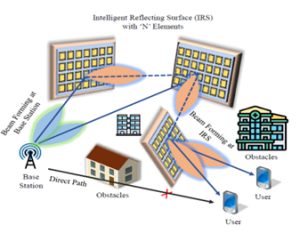Cutting-Edge Research by Dr Chinnadurai Elevates MIMO Wireless Communication Standards
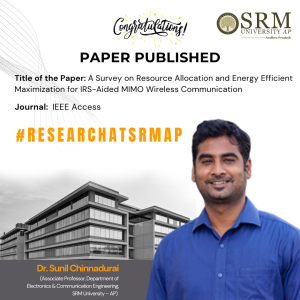
A Survey on Resource Allocation and Energy Efficient Maximization for IRS-Aided MIMO Wireless Communication
In a significant advancement for wireless communication technology, Dr Sunil Chinnadurai, Associate Professor in the Department of Electronics & Communication Engineering, has made a remarkable contribution to the field. His latest paper, titled “A Survey on Resource Allocation and Energy Efficient Maximization for IRS-Aided MIMO Wireless Communication,” has been published in the prestigious journal IEEE Access.
The paper delves into the intricacies of Intelligent Reflecting Surfaces (IRS) and their role in enhancing Multiple Input Multiple Output (MIMO) wireless communication systems. Dr. Chinnadurai’s research focuses on optimizing resource allocation and maximizing energy efficiency, which is a critical aspect of sustainable technological development.
This publication is expected to pave the way for more efficient and environmentally friendly wireless communication solutions, reflecting Dr Chinnadurai’s commitment to innovation and excellence in research.
Abstract of the Research
This paper surveys the integration of Multiple-Input Multiple-Output (MIMO) systems with Intelligent Reflecting Surfaces (IRS) in wireless communications. It explores how IRS technology enhances MIMO performance by manipulating the propagation environment through improved signal manipulation and beamforming. The survey covers resource allocation, energy efficiency techniques, optimization strategies, and practical implementation challenges. Key research areas and future directions are highlighted, emphasizing the potential of MIMO-enabled IRS systems to enhance wireless communication efficiency and coverage significantly.
Explanation of the Research in Layperson’s Terms
This paper explores how two advanced technologies, MIMO and IRS, can improve wireless communications. MIMO uses multiple antennas to enhance data transmission, while IRS involves smart surfaces that direct signal paths to boost strength and coverage. By combining these technologies, the paper examines how to make wireless networks faster, more reliable, and energy-efficient. It discusses practical ways to implement these improvements and identifies challenges and future research areas to make these advancements widely usable. In essence, this combination promises better wireless connectivity for everyone.
Practical Implementation or the Social Implications Associated with the Research
Integrating MIMO and IRS technologies into wireless networks can significantly enhance network performance, especially in urban and rural areas. Telecommunications companies can install IRS panels on structures to boost signal strength and coverage, while smart homes and cities can benefit from improved IoT connectivity and energy management. This combination also promotes energy-efficient networks, reducing operational costs and environmental impact. Socially, this technology can bridge the digital divide, providing better internet access to underserved areas and enhancing education, healthcare, and economic development. It supports new business models and innovations, leading to job creation and economic growth. Improved connectivity enhances quality of life through better access to information, entertainment, and remote work opportunities. Additionally, it strengthens public safety by improving communication during emergencies. Combining MIMO and IRS technologies promises a more connected, efficient, and sustainable world.
Pictures Related to the Research:
Future Research Plans
Future research on MIMO and IRS integration should focus on advanced optimisation for resource allocation and energy efficiency, innovative beamforming strategies, practical deployment challenges, and robust security protocols. Enhancing energy efficiency and contributing to standardization and regulation is also critical. These efforts will unlock the full potential of MIMO and IRS, leading to more efficient, reliable, and secure wireless communication systems.
- Published in Departmental News, ECE NEWS, News, Research News
From Views to Votes: Faculty Duo Unveils Political Activism on YouTube
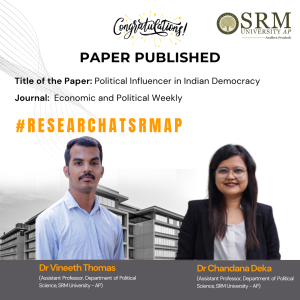 In a significant contribution to the field of politics, Dr Vineeth Thomas and Dr Chandana Deka, Assistant Professors in the Department of Political Science, have published an insightful paper titled “Political Influencer in Indian Democracy” in the esteemed Journal Economic and Political Weekly. Their work delves into the burgeoning role of YouTube as a platform for political engagement, highlighting a shift in the digital landscape where entertainment and politics intersect.
In a significant contribution to the field of politics, Dr Vineeth Thomas and Dr Chandana Deka, Assistant Professors in the Department of Political Science, have published an insightful paper titled “Political Influencer in Indian Democracy” in the esteemed Journal Economic and Political Weekly. Their work delves into the burgeoning role of YouTube as a platform for political engagement, highlighting a shift in the digital landscape where entertainment and politics intersect.
The paper explores the emergence of a new breed of political influencers who are leveraging the power of social media activism to shape public discourse. This pioneering study offers a fresh perspective on the dynamics of political communication in the age of digital media.
Abstract
In the YouTube landscape dominated by entertainment, Dhruv Rathee emerges as a prominent voice in political discourse and social media activism. His casual demeanour belies his impactful mission to mobilise Indians against perceived authoritarianism under the Modi government. Rathee’s journey began in 2016, focusing initially on educational content before delving into political commentary. His videos, known for their thorough research and straightforward presentation, address issues like governance, free speech, and electoral fraud. Despite criticisms of superficiality in his economic analyses, Rathee’s engaging style and significant social media influence highlight the transformative power of digital platforms in shaping public discourse. While YouTube journalism thrives on engagement and immediacy, traditional media’s depth and editorial rigor ensure its continued relevance in the media ecosystem.
Explanation of the Research in Layperson’s terms
Dhruv Rathee, a prominent YouTuber, has made a significant impact in the realm of political discourse and social media activism in India. Starting his journey around 2016, Rathee transitioned from creating educational content to addressing political issues, driven by his dissatisfaction with Prime Minister Narendra Modi’s administration. His videos are characterized by meticulous research and straightforward presentation, covering a wide range of topics such as governance, free speech, electoral fraud, and media bias. Rathee’s engaging style, which blends factual rigor with a conversational tone, has enabled him to connect with a broad audience, making complex political issues accessible to the layperson.
Despite criticisms of his sometimes superficial understanding of economic issues, Rathee’s ability to mobilise large audiences and his significant social media presence underscore the transformative potential of digital platforms in shaping public discourse. However, YouTube journalism, which often centers around individual personalities, can lack the depth and breadth of traditional journalism, emphasizing engagement and immediacy over comprehensive coverage.
In Traditional media, with its extensive resources, editorial rigor, and established trust, continues to play a vital role in the media landscape. Although mainstream media has faced criticism for spreading misinformation and manipulating public discourse, its structured approach to news remains indispensable. Both YouTube and traditional media have their strengths and limitations, highlighting the need for a balanced approach to news consumption from multiple sources to ensure a well-rounded understanding of current events.
Practical Implementation or the Social Implications Associated
The practical implementation of this research emphasises the necessity for a balanced approach to news consumption, combining insights from both YouTube influencers and traditional media to foster informed public discourse and preserve democratic values.
Collaborations
Electoral Politics
Future Research Plans
Indian govt and politics
- Published in Departmental News, News, Political Science News, Research News
Navigating the Future: Advancements in NLP for Enhanced Healthcare
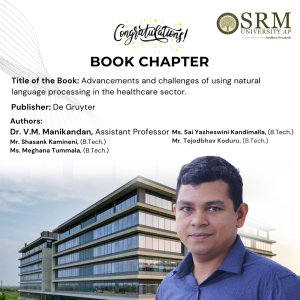 In a significant contribution to the intersection of technology and healthcare, Dr V M Manikandan, Assistant Professor in the Department of Computer Science and Engineering along with a team of dedicated undergraduate students, has co-authored a pivotal book chapter. The chapter, titled “Advancements and Challenges of Using Natural Language Processing in the Healthcare Sector,” has been published in the insightful book “Digital Transformation in Healthcare 5.0.”
In a significant contribution to the intersection of technology and healthcare, Dr V M Manikandan, Assistant Professor in the Department of Computer Science and Engineering along with a team of dedicated undergraduate students, has co-authored a pivotal book chapter. The chapter, titled “Advancements and Challenges of Using Natural Language Processing in the Healthcare Sector,” has been published in the insightful book “Digital Transformation in Healthcare 5.0.”
The collaborative effort by Dr Manikandan, Mr Shasank Kamineni, Ms Meghana Tummala, Ms Sai Yasheswini Kandimalla, and Mr Tejodbhav Koduru delves into the innovative applications and potential hurdles of implementing natural language processing (NLP) technologies in healthcare. Their work highlights the transformative power of NLP in analysing vast amounts of unstructured clinical data, thereby enhancing patient care and medical research.
This academic achievement showcases the expertise and commitment of the faculty and students and underscores the institution’s role in driving forward the digital revolution in healthcare. The chapter is expected to serve as a valuable resource for researchers, practitioners, and policymakers interested in developing smarter, more efficient healthcare systems.
Introduction of the Book Chapter
“Digital Transformation in Healthcare 5.0: IoT, AI, and Digital Twin” delves into how advanced technologies like IoT, AI, and digital twins are reshaping healthcare. It provides a comprehensive look at the integration challenges and technological advancements aiming to modernise medical practices. The chapter “Advancements and Challenges of Using Natural Language Processing in the Healthcare Sector” specifically explores how NLP processes vast data in healthcare to transform it into actionable insights, enhancing efficiency and patient care while highlighting the implementation challenges of these technologies. This book is crucial for healthcare and technology professionals interested in the future of digitally enhanced healthcare.
Significance of the Book Chapter
The chapter “Advancements and Challenges of Using Natural Language Processing in the Healthcare Sector” is significant because it encapsulates my interest and expertise in harnessing NLP to enhance healthcare operations. It showcases the potential of technology in transforming healthcare data into valuable, actionable insights, directly aligning with my focus on improving patient outcomes through technological innovation.
- Published in Computer Science News, CSE NEWS, Departmental News, News, Research News
Dr Maheshwar Publishes Significant Research in Materials Letters
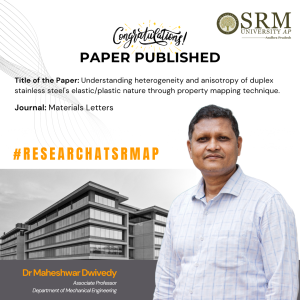 In a remarkable achievement, Dr Maheshwar Dwivedy, Associate Professor in the Department of Mechanical Engineering, has made a significant contribution to the field of materials science with his latest publication. The paper, entitled “Understanding heterogeneity and anisotropy of duplex stainless steel elastic/plastic nature through property mapping technique,” has been published in the esteemed journal Materials Letters, which boasts an impact factor of 3.0.
In a remarkable achievement, Dr Maheshwar Dwivedy, Associate Professor in the Department of Mechanical Engineering, has made a significant contribution to the field of materials science with his latest publication. The paper, entitled “Understanding heterogeneity and anisotropy of duplex stainless steel elastic/plastic nature through property mapping technique,” has been published in the esteemed journal Materials Letters, which boasts an impact factor of 3.0.
Dr Dwivedy’s research provides insightful analysis of the complex behaviours of duplex stainless steel, a material known for its high strength and corrosion resistance. By employing a property mapping technique, the study reveals the intrinsic heterogeneity and anisotropy of the material’s elastic and plastic properties. This groundbreaking work not only advances the understanding of duplex stainless steels but also opens up new possibilities for their application in various industries.
The publication of this paper in a journal with a significant impact factor is a testament to the quality and importance of the research conducted by Dr Dwivedy and his team. It underscores SRM University – AP’s commitment to fostering cutting-edge research and innovation.
Abstract
Accelerated property mapping, an advanced indentation technique, was used to describe the nanomechanical behaviour of duplex stainless steel (DSS) surfaces prior to and post-heat treatments. Heterogeneity in deformation responses and relative elastic and/or plastic nature of DSS was assessed on longitudinal and transverse directions through load-displacement curves, property maps, histograms of hardness (H), modulus (E) and indentation works. Empirical ratios such as H/E, (H/E)1/2, H3/E2 and plasticity index were employed to understand the anisotropy across the directions. It is crucial that for structural designing, heterogeneity and anisotropy of mechanical behaviour need to be accounted for improved property–optimisation.
Explanation of the Research in Layperson’s Terms
Duplex stainless steel (DSS), a unique category of steel, contains almost equal amounts of ferrite and austenite phases within its microstructure. These are employed in applications like boilers, pressure vessels, heat exchangers, etc., as they offer superior strength, ductility, toughness, and corrosion resistance properties compared to other steels. Mechanical characteristics of DSS are significantly influenced by manufacturing protocols including heat treatments. It is believed that anisotropy and heterogeneity in mechanical behaviour can be driven by microstructures post-material processing.
A comprehensive understanding of DSS material behaviour at the macroscopic scale is not feasible without knowledge of its features and their properties locally. Although the mechanical properties of DSS have been widely explored from a macroscopic perspective as well as innovative nano-scale property mapping techniques, the number of studies addressing anisotropy seen through small-scale characterization is rather restricted. In general, the preliminary assessment of the mechanical behaviour commonly done through hardness (H) and modulus (E) properties. For estimating the elasticity and/or plasticity of material or any surface, different empirical ratios were adopted namely H/E, H3/E2 and (H/E)1/2.
Practical Implementation or the Social Implications Associated
• This study demonstrates the notable differences in mechanical properties in longitudinal and transverse directions along with heterogeneity before and after heat treatments.
• It is felt crucial that for structural designing, heterogeneity and anisotropy of mechanical behaviour need to be accounted for improved property-optimisation.
- Published in Departmental News, Mechanical Engineering NEWS, News, Research News
Joining Hands to Save Lives: Celebrating World Blood Donor’s Day
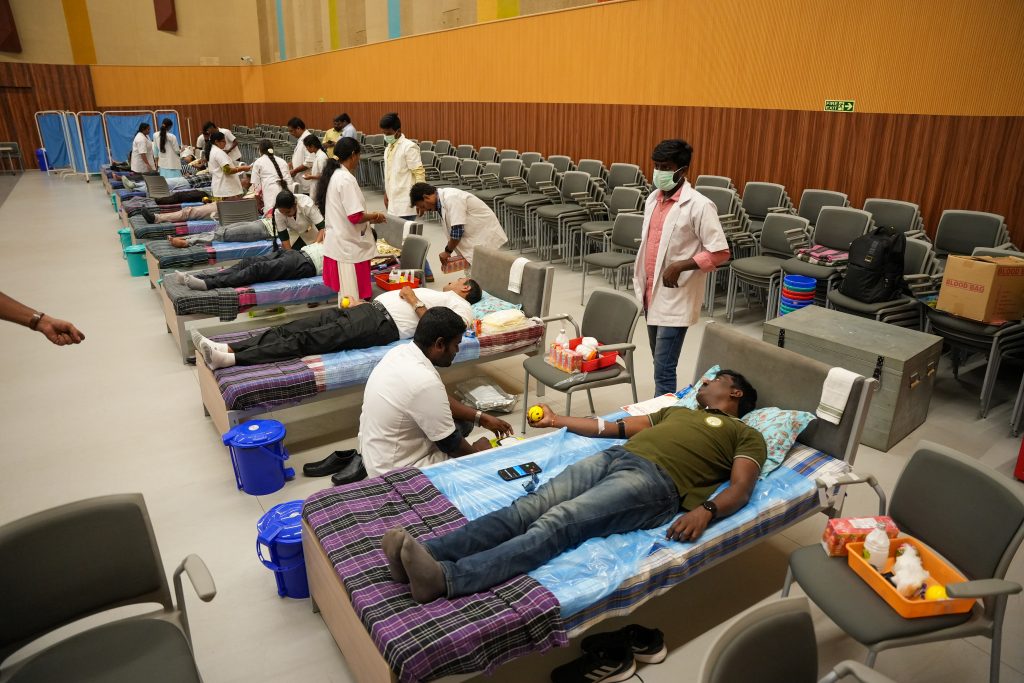
In a commendable display of community spirit and dedication to saving lives, SRM University-AP hosted a Blood Donation Camp to honour World Blood Donor’s Day. Organised in collaboration with Guntur Medical College, the event marked a significant success and underscored the university’s steadfast commitment to societal welfare.
The camp’s inauguration was graced by Chief Guest Mr Venugopal Reddy, Collector of the Guntur Region. He was accompanied by Dr V Kiran Kumar, Chief Surgeon, and his team from the Government Blood Centre at Government General Hospital-Guntur, Dr R Premkumar, Registrar of SRM University-AP, and Ms Revathi Balakrishnan, Associate Director of Student Affairs, and other key dignitaries witnessed the inaugural ceremony.
In his opening address, Mr Venugopal Reddy stressed the crucial significance of blood donation, emphasising that “Blood is a vital component that cannot be artificially manufactured in laboratories.”
Registrar Dr Premkumar emphasised the importance of donating blood and highlighted that “donation continues to be the sole way to guarantee an ongoing supply of this life-saving elixir.” He stressed the significance of these camps in cultivating a culture of altruism and accountability within the university community.
The university enthusiastically participates in coordinating frequent blood donation drives to support the community and meet the demand for blood donations. The event also served as a platform to dispel myths surrounding blood donation, thereby encouraging broader participation. The students, faculty, and staff of SRM University-AP showed immense enthusiasm in donating blood, significantly contributing to the camp’s outstanding success.
Adding to the day’s significance, Dr Karthik Rajendran, Associate Dean-QAR, was honoured with the Lifesaver Award by the Indian Red Cross Society. This prestigious accolade was bestowed in recognition of his substantial contributions to blood donation and his unwavering commitment to saving lives.
The varsity’s Blood Donation Camp exemplifies the profound impact of collective effort in addressing critical healthcare needs. It highlights the university’s unwavering commitment to making a positive societal impact and reinforces the importance of regular blood donation and community service.
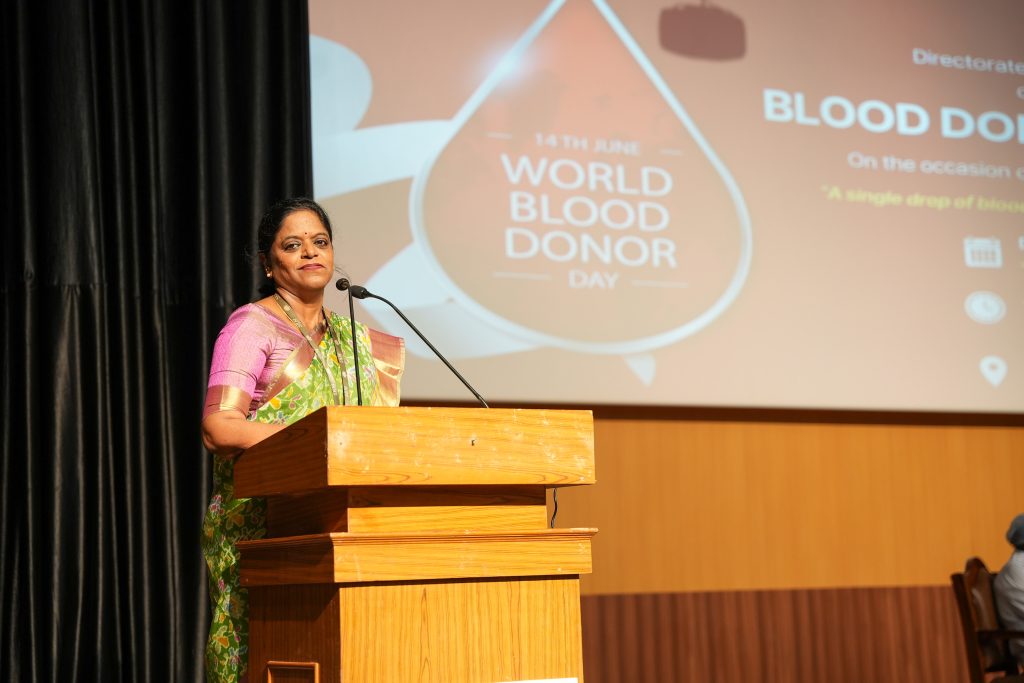
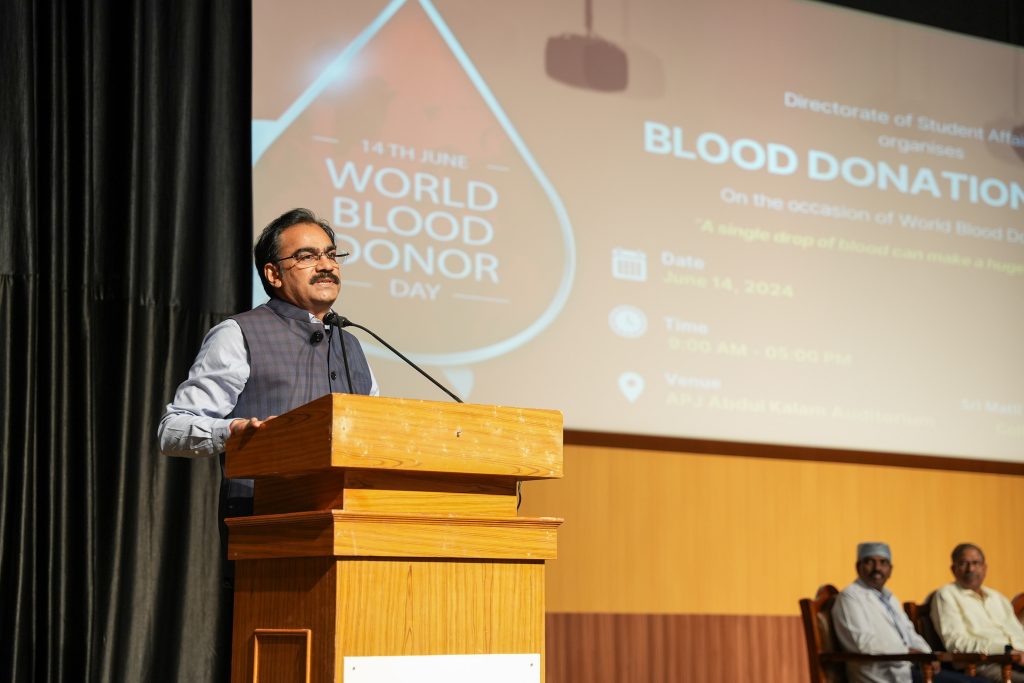
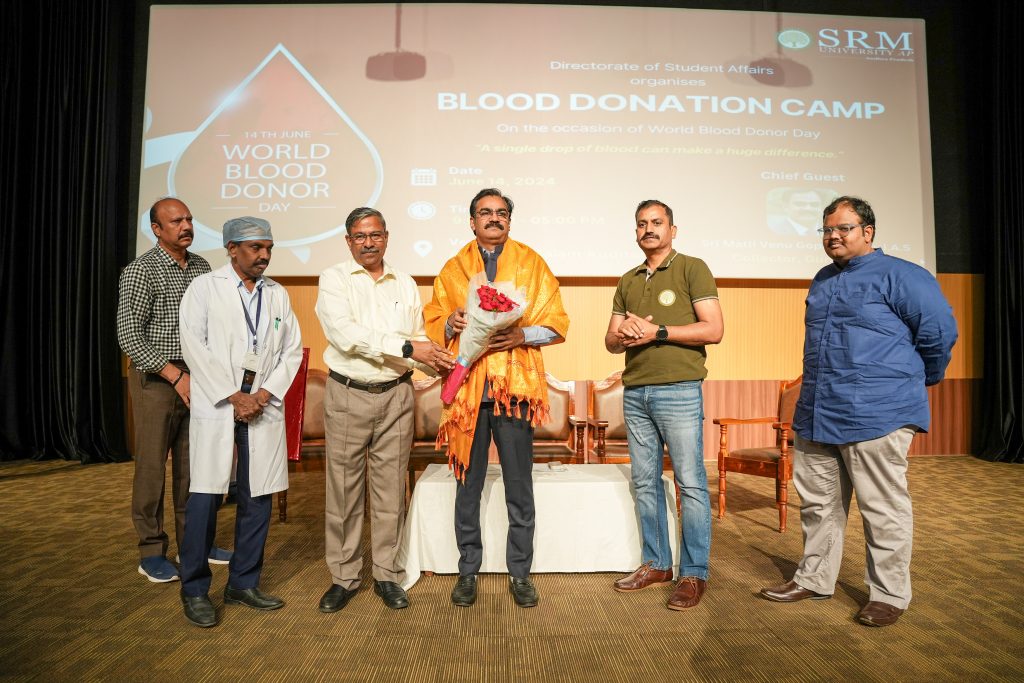
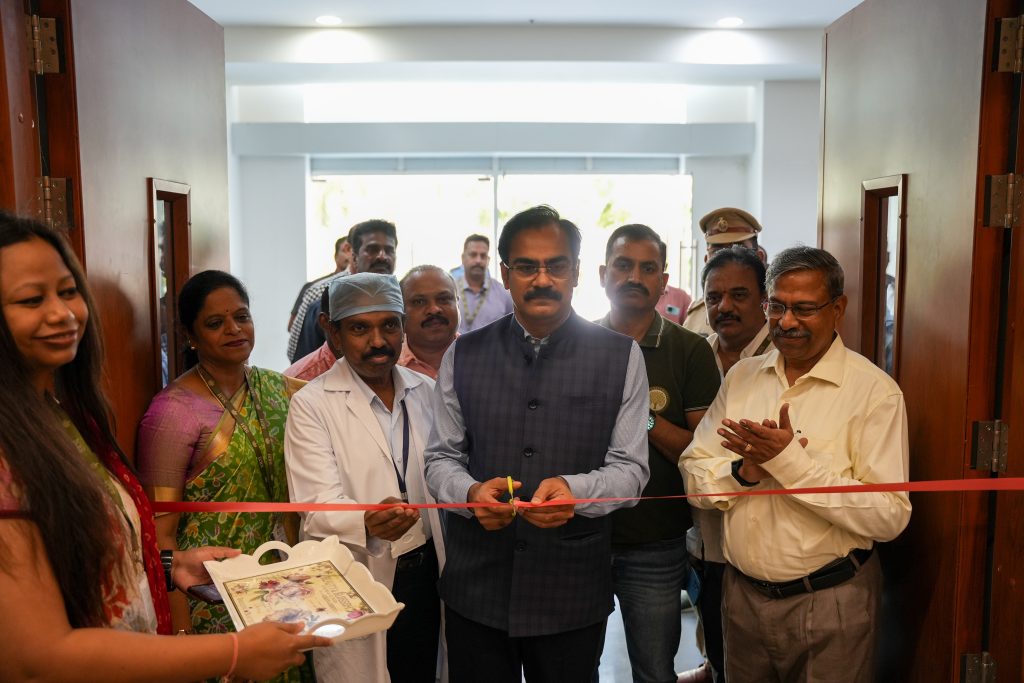
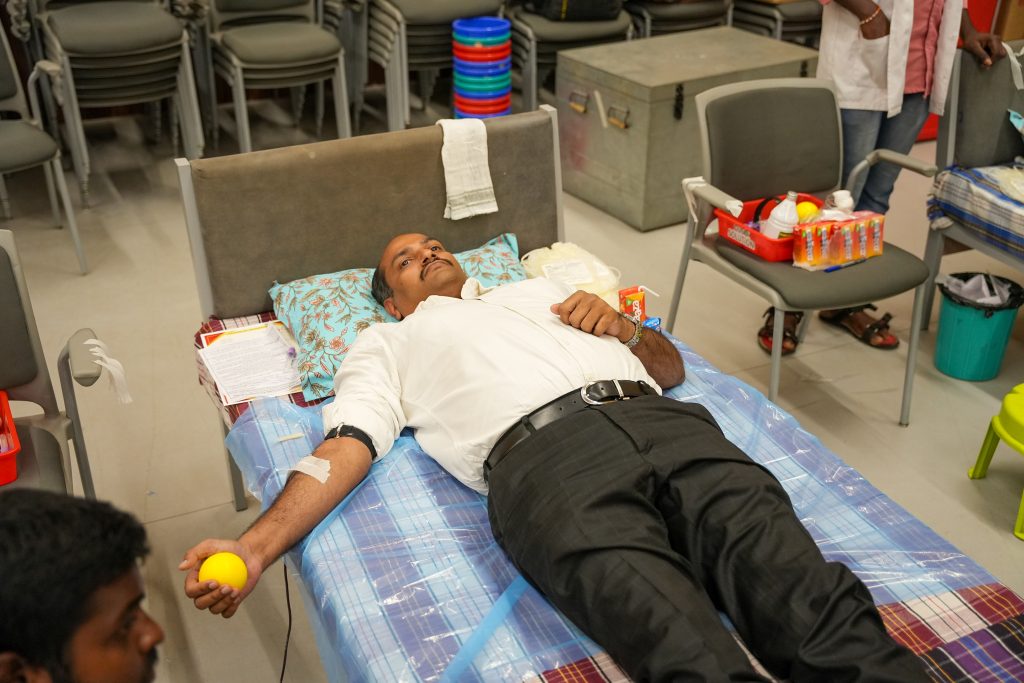
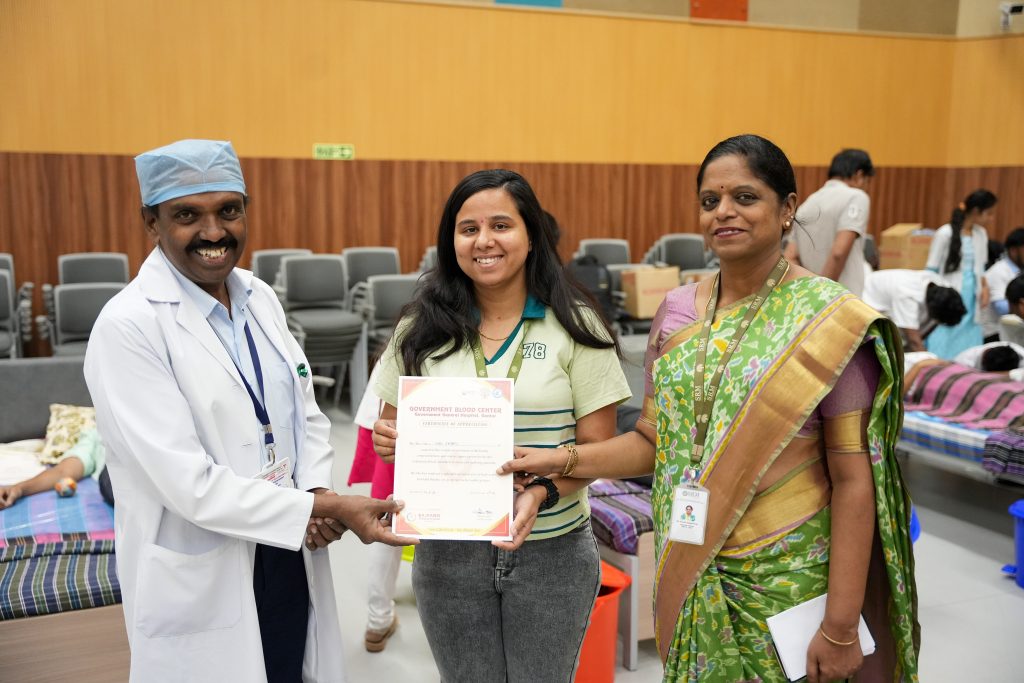
- Published in Departmental News, News, student affairs news, Students Affairs Events, University Event
Significant Advancement in Analytical Detection of NFZ by the Department of Chemistry and RARE Lab
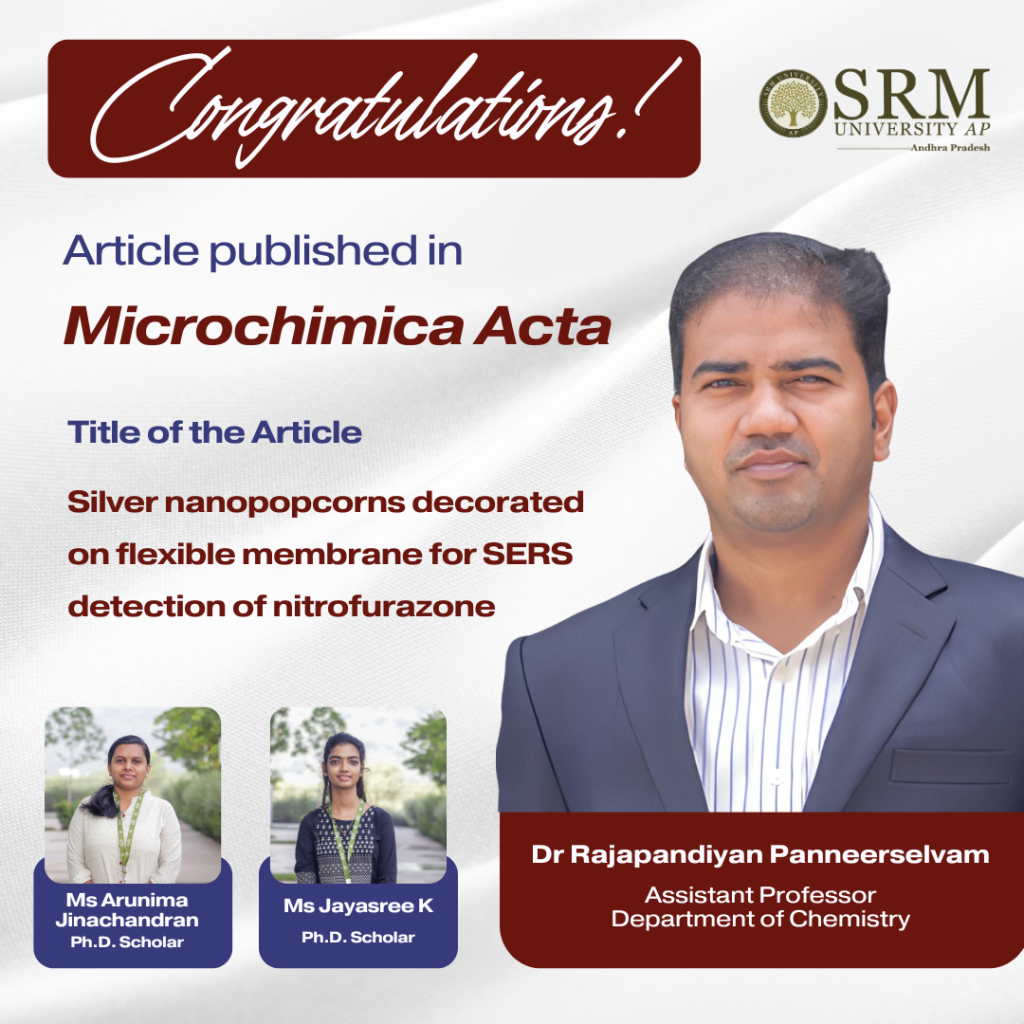
The Department of Chemistry and RARE Lab are excited to announce a groundbreaking advancement in the field of analytical detection. Researchers Dr Rajapandiyan Panneerselvan, Asst. Professor and Ph.D scholars, Ms Arunima Jinachandran and Ms Jayasree Kumar have developed a novel method for detecting nitrofurazone (NFZ) using three-dimensional silver nanopopcorns (Ag NPCs) on a flexible polycarbonate membrane (PCM) in their paper “Silver nanopopcorns decorated on flexible membrane for SERS detection of nitrofurazone” published in Microchimica Acta. This innovative technique leverages the power of surface-enhanced Raman spectroscopy (SERS) to provide a highly sensitive and practical solution for detecting NFZ on various surfaces, including fish.
Nitrofurazone (NFZ) is an antibiotic commonly used in veterinary medicine that poses significant health risks if residues enter the food chain. Despite regulatory bans, its illegal use continues, necessitating highly sensitive detection methods. While effective, traditional methods such as high-performance liquid chromatography and mass spectrometry are often costly and labor-intensive. The new SERS-based method offers a more efficient and straightforward alternative.
Abstract
The synthesis of three-dimensional silver nanopopcorns (Ag NPCs) onto a flexible polycarbonate membrane (PCM) for the detection of nitrofurazone (NFZ) on fish surfaces by surface-enhanced Raman spectroscopy (SERS) is presented. The proposed flexible Ag-NPCs/PCM SERS substrate exhibits significant Raman signal intensity enhancement with a measured enhancement factor of 2.36 × 10^6. This enhancement is primarily attributed to the hotspots created on Ag NPCs, which include numerous nanoscale protrusions and internal crevices distributed across the surface. The detection of NFZ using this flexible SERS substrate demonstrates a low limit of detection (LOD) of 3.7 × 10^−9 M and uniform, reproducible Raman signal intensities with a relative standard deviation below 8.34%. The substrate also exhibits excellent stability, retaining 70% of its efficacy even after 10 days of storage. Notably, the practical detection of NFZ in tap water, honey water, and fish surfaces achieves LOD values of 1.35 × 10^−8 M, 5.76 × 10^−7 M, and 3.61 × 10^−8 M, respectively, highlighting its effectiveness across different sample types. The developed Ag-NPCs/PCM SERS substrate presents promising potential for the sensitive SERS detection of toxic substances in real-world samples.
Methodology
The synthesis involves creating silver nanopopcorns on a flexible polycarbonate membrane using a simple chemical method. The resulting Ag NPCs exhibit high surface roughness with numerous nanoscale features that enhance the Raman signal. This flexible substrate can easily collect samples from irregular surfaces without requiring extensive preparation.
This SERS substrate can detect NFZ in various real-world samples, including:
- Tap water
- Honey water
- Fish surfaces
The method’s sensitivity and ease of use make it a promising tool for ensuring food safety and monitoring environmental contaminants.
The Department believes this development will significantly impact public health by providing a reliable and accessible method for detecting harmful substances in the food chain.
- Published in Chemistry-news, Departmental News, News, Research News
Innovative System for Detection and Classification of Manufacturing Defects in PCB
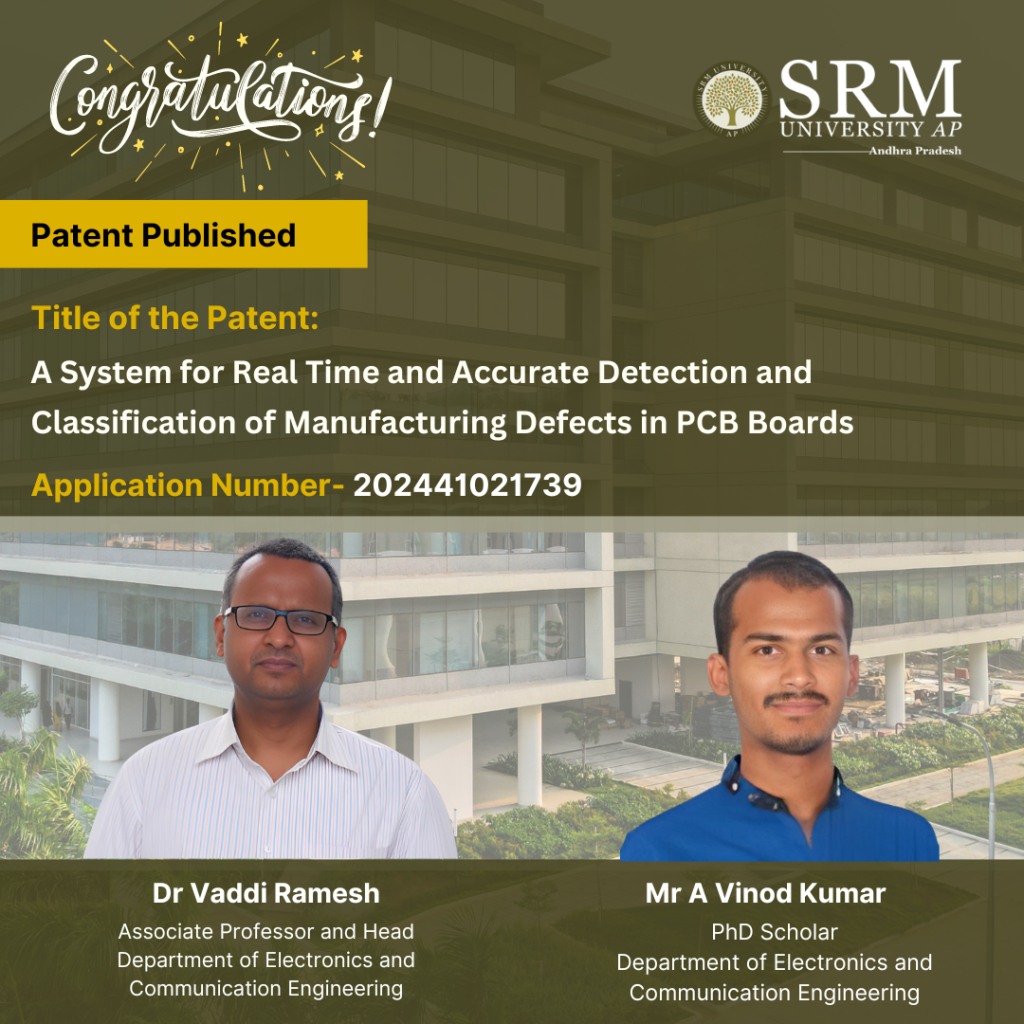
Dr Ramesh Vaddi, Associate Professor & Head of the Department of Electronics and Communication Engineering, along with his PhD Scholar Mr A Vinod Kumar has developed a new system for real-time and accurate detection and classification of manufacturing defects in Printed Circuit Boards (PCBs). This groundbreaking invention has been filed and published with Application Number: 202441021739 in the Patent Office Journal.
Abstract
This study presents a new system for real-time detection and classification of defects in Printed Circuit Boards (PCBs), which are critical in electronic products and systems. It employs an efficient model with pre-trained weights to detect defects for enhanced quality control. The model is initially trained and fine-tuned on a computer and then deployed on a compact computing board. For real-time imaging, a high-definition USB camera is connected to the system, allowing direct defect identification without the need for external devices. The output is shown on a monitor, with the PCB image featuring clearly labelled boxes to indicate the type and location of defects. This method offers a streamlined approach to defect classification, helping to improve the quality control process in electronics manufacturing.
Explanation of the Research in Layperson’s Terms
This research focuses on finding defects in PCBs, which are essential for most electronic devices like computers and phones. The system uses a powerful computer model to quickly identify any defects in real time. The model is trained on a regular computer to recognise normal PCBs and various defects. Once ready, it is transferred to a small, efficient computer board. A camera captures images of the PCBs, and the system analyses these images to identify defects. The results are displayed on a screen, clearly marking where the defects are and what types they are. This helps companies quickly and accurately detect defects in their electronics manufacturing process, saving time, reducing waste, and improving product quality
Practical Implementation/Social Implications of the Research
The practical implementation of this research involves deploying a system for real-time detection and classification of defects in PCBs, essential components in nearly all electronic devices. Using advanced deep learning techniques, the system can quickly identify manufacturing defects early in the production process. This leads to significant improvements in quality control, reduced waste, and lower production costs. By improving quality control in electronics manufacturing, the system helps reduce electronic waste, a significant environmental concern. Early detection of defects also decreases the chances of faulty electronic products reaching consumers, enhancing safety and reducing the need for product recalls. The system’s efficiency and accuracy could lead to more reliable electronics, fostering greater consumer trust in electronic products. This, in turn, encourages companies to invest in higher-quality manufacturing processes, ultimately leading to a more sustainable and responsible electronics industry.
Collaborations
To develop this system, the research team first trained a computer model to recognise defects in PCBs. The training involved feeding the model a large dataset of PCB images, some with defects and some without. The model learned to identify common defects by analysing these examples. Once trained, the model was implemented in a real-time setting and integrated with equipment to inspect PCBs during production. The system used a camera to capture images of each PCB and applied the trained model to analyse these images for defects. Running in real-time, the system could immediately detect issues and alert the manufacturing team, allowing them to correct problems on the spot. This approach improved product quality, reduced the chances of defective electronics reaching consumers, sped up the quality control process, and reduced waste, making the manufacturing process more efficient.
Future Research Plans
The research team has outlined several future plans to enhance and expand their defect detection system for PCBs:
- Model Optimization: Refining the machine learning model to improve accuracy and speed, experimenting with different architectures and training techniques to boost performance.
- Expanded Defect Library: Gathering a more extensive dataset of PCB defects to enable the model to identify a wider range of issues, making the system more versatile for various manufacturing environments.
- Real-World Testing: Testing the system in a broader range of manufacturing settings to ensure robustness and adaptability, understanding performance in diverse scenarios, and fine-tuning for optimal results.
- Integration with Manufacturing Systems: Aiming to integrate the system with other manufacturing processes and technologies for seamless communication between defect detection and other quality control systems, enhancing overall workflow.
- Automation and Robotics: Exploring the use of automation and robotics to streamline the defect detection process, potentially leading to a more automated manufacturing line with reduced human intervention and errors.
- Collaboration and Partnerships: Planning to collaborate with more industry partners and academic institutions to accelerate research and development, gaining valuable insights and resources to advance the system.
- Published in Departmental News, ECE NEWS, News, Research News
India’s Tryst with Globalization: A Study on Growth and Poverty Nexus
The poor in India has continuous future benefits from globalization through improved healthcare – A new research from SRM University-AP economists
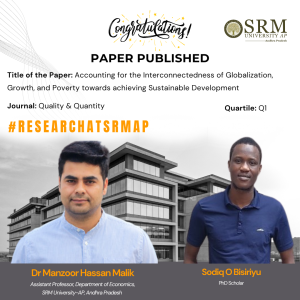 In a groundbreaking study, Dr. Manzoor H. Malik, an Assistant Professor in the Department of Economics, and Sodiq O. Bisiriyu, a Research Scholar, have developed a comprehensive framework known as the globalization-growth-poverty (GPP) triangular nexus.
In a groundbreaking study, Dr. Manzoor H. Malik, an Assistant Professor in the Department of Economics, and Sodiq O. Bisiriyu, a Research Scholar, have developed a comprehensive framework known as the globalization-growth-poverty (GPP) triangular nexus.
This innovative model examines the interplay between globalisation waves, economic growth trends, and their collective impact on poverty reduction in India, aligning with the nation’s commitment to achieving Goal 1 of the Sustainable Development Goals.
The researchers used three different indicators of poverty, encompassing the monetary and non-monetary constructs. The research controls for the impact of government development spending and domestic investment in the GPP nexus. The result of the research validates the significant globalization-led growth hypothesis in the short run and establishes the existence of the GPP triangular nexus in India. Additionally, the researchers found positive association of globalization and growth with monetary and non-monetary poverty measures in the short-run while the impact on monetary measure in the long-run is ambiguous.
Finally, the results offer significant insight into the impact of government development spending and domestic investment on poverty. The results prove that government development expenditure in India is detrimental to non-monetary poverty while domestic investment have insignificant impact on all poverty constructs.
From policy perspective, the researcher said, “the short-run validation of globalization-led growth hypothesis for India is challenging and calls for government broad-based framework to tackle impediments of long-term globalization-led growth and monetary poverty benefits”. They emphasized that only sustained long-term growth can accelerate the vision of India as stated in “Viksit Bharat 2047” agenda. Published in the esteemed ‘Quality & Quantity’ journal by Springer, with an impact factor of 2.87, this study provides valuable insights for academics, practitioners, and policymakers. It sheds light on the complex dynamics shaping contemporary socio-economic environments and offers evidence-based analysis supported by an extensive review of relevant literature.
- Published in Departmental News, Economics Current Happenings, News, Research News
Professor and Scholar Duo filed Patent for Employee Productivity Enhancement System
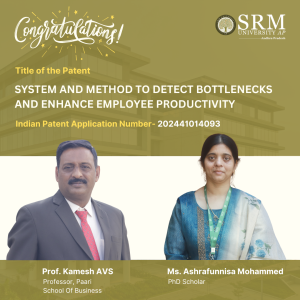 In a significant development, Prof. Kamesh AVS, Professor at Paari School of Business, along with his PhD Scholar, Ms. Ashrafunnisa Mohammed, has successfully published and filed a groundbreaking patent titled “SYSTEM AND METHOD TO DETECT BOTTLENECKS AND ENHANCE EMPLOYEE PRODUCTIVITY” with the Application Number: 202441014093 A in the Patent Office Journal.
In a significant development, Prof. Kamesh AVS, Professor at Paari School of Business, along with his PhD Scholar, Ms. Ashrafunnisa Mohammed, has successfully published and filed a groundbreaking patent titled “SYSTEM AND METHOD TO DETECT BOTTLENECKS AND ENHANCE EMPLOYEE PRODUCTIVITY” with the Application Number: 202441014093 A in the Patent Office Journal.
This pioneering system aims to revolutionise the way organisations detect and alleviate bottlenecks within their operations, consequently boosting overall employee productivity. The patent’s unique approach and methodology signify a remarkable stride towards fostering efficiency and performance in the workplace. Prof. Kamesh AVS and Ms. Ashrafunnisa Mohammed’s collaborative effort underscores their commitment to innovation and research excellence. Their accomplishment not only reflects their expertise in the field but also highlights the spirit of ingenuity and problem-solving that drives academia at Paari School of Business.
The SRM AP community extends its heartfelt congratulations to Prof. Kamesh AVS and Ms Ashrafunnisa Mohammed on this remarkable achievement and eagerly anticipates the positive impact their invention will have on the realm of employee productivity and operational efficiency.
Abstract of the Research
SYSTEM AND METHOD TO DETECT BOTTLENECKS AND ENHANCE EMPLOYEE PRODUCTIVITY
The present disclosure relates to a system for detecting bottlenecks and enhancing employee productivity. The system broadly includes an input module (106), a pre-processing module (108), a segmentation module (110), a feature selection module (112), a feature extraction module (114), a data training module (116), and a classification module (118). The system also consists of a data repository (102), a processor (104), and an evaluation module (120). The present disclosure aims to examine counterproductive work behaviors of employees through the effort-reward imbalance model by considering dark triad traits as moderators. The dark triad traits can indulge the employees more in unethical practices in organizations and one among those traits is Narcissism which negatively affects counterproductive work behaviors. Organizations can predict the Dark Triad traits in individuals, and they can avoid unethical practices in organizations and counterproductive work behaviors.
Explanation of the Research in Layperson’s Terms:
The present process aims to examine counterproductive work behaviors through the effort-reward imbalance model by taking into consideration Dark triad traits as moderators. The Dark Triad traits can indulge the employees more in unethical practices in organizations and one among those traits is Narcissism which negatively affects counterproductive work behaviors. Organizations can predict the Dark Triad traits in individuals, and they can avoid unethical practices in organizations and can avoid counterproductive work behaviors. There is a notable knowledge gap concerning the moderating role of Dark Triad traits in the relationship between efforts and rewards imbalance and counterproductive work behaviors, even though there is existing research on both the association between Dark Triad traits and counterproductive work behaviors and the relationship between efforts and rewards imbalance and counterproductive work behaviors.
Practical Implementation or Social Implications Associated with the Research:
• The Invention aims at identifying and eliminating the consequences of the Dark Triad Traits while performing Human Resources Practices like Recruitment, Training and Development, Performance Analysis, and Compensation and Reward Management system.
• The Invention either weakens or eliminates the Counter Productive work behaviors as a potential consequence of springing up of Dark Triad traits during the execution of various Human Resource practices in the organizations and this leads to achieving the estimated Organizational Productivity as per the strategy.
• Organizations can identify the impact of the Dark triad traits on employees and take steps to reduce the stress that leads to unproductive work behaviors.
• Organizations can eliminate the job stressors which are seen as the main sources of
• Counterproductive work behaviors can indicate the Dark triad traits’ influence on individuals.
• Management should investigate the causes of rudeness in the workplace to improve morale and productivity.
• During the hiring process, management should use a battery of psychological tests to gain insight into candidates’ personalities.
• Management can formulate standard policies to eliminate malicious activities and avoid effort-reward imbalances and counterproductive work behaviors.
• Understanding the causes of counterproductive workplace behavior is vital because it has become a widespread and expensive problem for businesses worldwide.
Future Research Plans
To Incorporate AI and ML tools to identify the Dark Triad traits, thereby enhancing the employee evaluation process and mitigating counterproductive work behaviors within organisations.
- Published in Departmental News, News, Paari Current Happenings, Research News
Innovative Insights: Rupesh Kumar’s Book Unveils Advances in Wireless Technologies
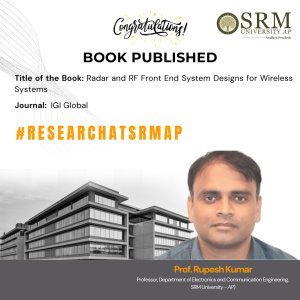 In a remarkable stride for the field of wireless communication, Prof. Rupesh Kumar from the Department of Electronics and Communication Engineering has authored a pivotal book that promises to redefine our understanding of radar and RF systems. The book, entitled “Radar and RF Front End System Designs for Wireless Systems,” is the latest gem in the prestigious “Advances in Wireless Technologies and Telecommunication (AWTT)” series.
In a remarkable stride for the field of wireless communication, Prof. Rupesh Kumar from the Department of Electronics and Communication Engineering has authored a pivotal book that promises to redefine our understanding of radar and RF systems. The book, entitled “Radar and RF Front End System Designs for Wireless Systems,” is the latest gem in the prestigious “Advances in Wireless Technologies and Telecommunication (AWTT)” series.
With his profound expertise, Prof. Kumar navigates through the complexities of designing state-of-the-art front-end systems, offering readers a treasure trove of knowledge that bridges theory and practical application. This book is set to become an essential read for aspiring engineers and seasoned professionals alike, enriching the academic and industry landscape with its innovative approach.
Join us in celebrating Prof. Kumar’s exceptional contribution to the world of electronics and communication engineering. Dive into the depths of this masterful work and emerge with insights that could shape the future of wireless systems.
About the Book:
Radar and RF Front End System Designs for Wireless Systems delves into the intricate world of wireless technologies, particularly focusing on radar and RF front-end systems. The advent of wireless communication has ushered in a new era of connectivity, revolutionising various sectors including healthcare, smart IoT systems, and sensing applications. In this context, the role of RF front-end systems, with their reconfigurable capabilities, has become increasingly vital. The impetus behind this book stems from the remarkable surge in innovation witnessed in RF front-end systems. Researchers and practitioners alike have contributed a plethora of new configurations and design architectures, paving the way for unprecedented advancements in wireless systems. Our aim with this publication is to provide a platform for researchers to explore both theoretical insights and practical applications, thereby facilitating the dissemination of the latest trends and developments in the field. The contents of this book cover a wide spectrum of topics, ranging from RF frontend antenna systems to the impact of artificial intelligence and machine learning in system design. With contributions from experts in academia and industry, readers can expect a comprehensive exploration of radar and antenna system design, modeling, and measurement techniques. We envision this book serving as a valuable resource for students, researchers, scientists, and industry professionals seeking to deepen their understanding of RF front-end antenna and radar system designs. Whether it’s exploring reconfigurable antenna systems for 5G/6G networks, or delving into radar modelling and signal processing techniques, this book offers insights that are both timely and relevant.
Co-author of the Book:
Shilpa Mehta, a co-author of the book, holds a PhD from Auckland University of Technology, New Zealand. Presently, she serves as a Teaching Assistant at AUT, Auckland. Shilpa received the Summer Doctoral Research Scholarship for her PhD work. Her research spans across projects such as Radio Frequency Integrated Circuits, RF front ends, Optimization, Internet of Things, Wireless Communication, Artificial Intelligence, Healthcare, Radars, Software-defined Radios, and Smart Cities.
For the Book Chapter Publication, Click the Link
- Published in Departmental News, ECE NEWS, News, Research News



